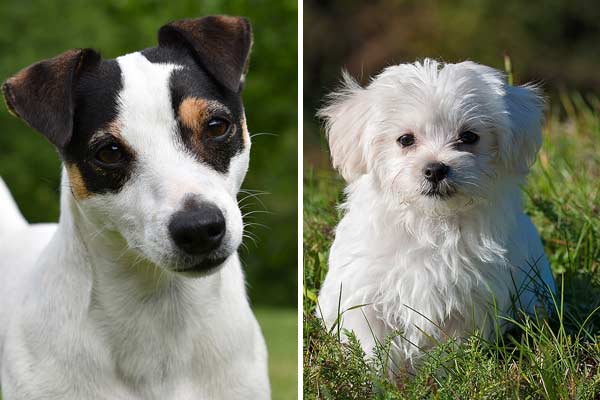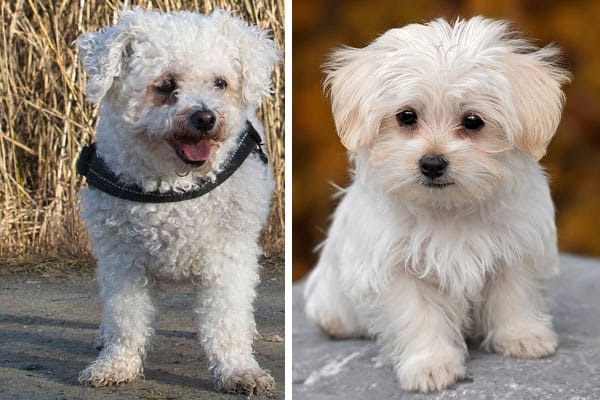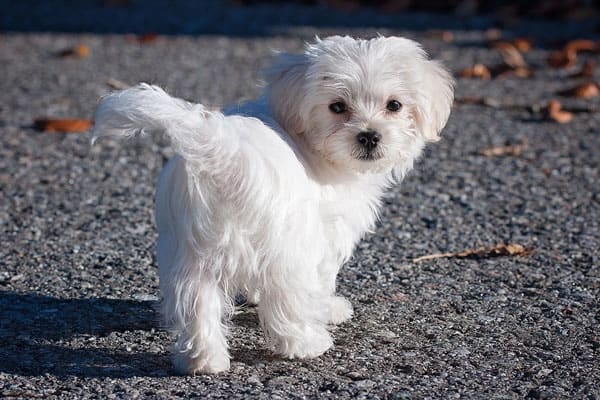Are Maltese Good With Other Dogs: What to Know Before Adding a Maltese to Your Canine Family

The tiny Maltese dog first became popular as far back as 1,500 B.C. during the time of the ancient Phoenicians. These dogs were first documented on the equally tiny Mediterranean island of Malta in what is now Greece.
Maltese dogs have managed to survive over thousands upon thousands of years’ time, during the rise and fall of many mighty emperors and empires.
Maltese dogs have a very human hair-like coat of pure white that gives them an unusually polished and sophisticated appearance and they seem to know it. This can cause some troubles in multi-dog households, however.
Is the Maltese good with other dogs? What do you need to know before adding a Maltese to your existing canine family? Find out now in this article.
Are Maltese Good With Other Dogs?
The Maltese is small in size but big in personality and temperament. As many fans of the breed attest, the Maltese often don’t seem to know they are a very small dog. These dogs have become used to serving as watchdogs to whole palaces or outposts, barking out warnings about possible intruders.
Unfortunately, the Maltese dog’s imperious personality and tiny size can mean they aren’t always good with other dogs.
Get Tips for How to Introduce Your Other Dogs to a Maltese Dog
It is easy to assume that all dogs will just learn to get along. However, as far too many dog lovers will tell you, this is far from the case.
Just like you may not like all people you meet, this video explains why some dogs may not like each other and how to smooth ruffled fur when the need arises.
Why Would a Maltese Not Like Another Dog?
While modern domestic dogs have evolved to live closely with people and bond intensely to “their” people, the same does not always hold true of dogs with other dogs.
Some dogs, such as Siberian Huskies and other sled dog breeds, are still bred to live and work very closely with large groups of other dogs.
But many pet dogs, including the Maltese, are bred to live and work closely with humans. They may be an “only dog” and be carried around and pampered and spoiled.
This can really cause problems when you add another dog to your family. Your Maltese may feel threatened by that new dog or jealous of the time and attention you give the new dog.
Your Maltese may also defend their food, toys, bedding, and yard from the new dog. Even if you do your very best to make the introductions in a way that can foster friendship, you can’t count on the two dogs liking each other and becoming friends.
When a Maltese Shouldn’t Be Paired With Another Dog
As PetMD explains, a Maltese isn’t the right dog breed for every individual or family.
Families with babies or young children are urged to reconsider the choice of a Maltese. Very young children often cannot readily understand how to play very gently with a tiny toy dog like the Maltese and this can cause the Maltese to become aggressive.
Similarly, larger breed puppies or adult dogs with naturally boisterous personalities might cause injury to a tiny Maltese without having any intention of doing so. This in turn may create a situation where a Maltese would become aggressive in self-defense.
For larger dog breeds, in particular, a toy-sized Maltese can look like a dog toy!
But even when other family dogs or other dogs at the dog park don’t have any motivation to harm a Maltese, a tiny Maltese might feel threatened or afraid and act in aggressive ways out of fear.
Alternately, a Maltese might become very fearful and timid to try to avoid being harmed. This is a terrible quality of life for your Maltese and can lead to health problems later from continually elevated stress levels.
Maltese Can Be Good With Other Dogs
As Veterinary Village Clinic highlights, because the Maltese do have an assertive, bold personality, this tiny dog can get along well with other dogs in specific situations.
But the Maltese need certain things in order to be able to live and play well with another dog.
Specifically, the Maltese need to feel safe to play and cuddle and eat and sleep and do all those dog things without being mouthed or crushed or overwhelmed by another dog’s size or strength.
This can mean that pairing a Maltese with another puppy might not go well, especially if the puppy is a large breed and is very high-energy.
But pairing a Maltese with a low energy senior dog or a more passive larger breed dog could go very well.
As long as the other dog is gentle and loving and feels secure enough not to challenge the Maltese dog’s need for your time, attention, and lap, it is quite possible that a Maltese could become friends with another dog.
Similarly, if you have a Maltese that is older and more sedentary and just likes to sit and nap on your lap, your Maltese may not be bothered by a younger dog that is more rambunctious and wants to take long walks and play outside.
Just like when you are choosing a new friend for yourself, it is important to consider all the variables before choosing a new friend for your dog.
How to Decide If Your Maltese Can Get Along With Another Dog
According to the Animal Humane Society, it is vital to take some safety precautions when you decide to introduce two dogs for the first time.
This is never more important than when you are introducing your dog to another dog that might also join your family.
When you do the first introductions well, you can get a good sense of whether the two dogs might get along well enough to live together.
Here are some guidelines to implement to make sure your dog and the new dog have a productive first meet and greet:
- Make sure both dogs are leashed during the first meet.
- Meet on some type of neutral territory away from your home and yard.
- Have a friend to handle the other dog.
- Keep the first meet very short and positive.
- Reward your dog for looking at you versus interacting with the other dog.
- Help your dog associate the new dog with good things like treats and praise.
Is It Better to Get a Same-Gender or Different Gender Dog for Your Maltese?
As this Maltese owner forum highlights, it is important to make sure that both dogs are “fixed” (neutered or spayed) to avoid tensions relating to a dog that is in heat.
As long as you take care of this before you introduce the two dogs for the first time, gender is not likely to matter a great deal in terms of whether the two dogs get along.
This is especially true if you are adding another Maltese and you already have a Maltese or a Maltese mix dog. Maltese do tend to get along well with other Maltese, perhaps more so than with a different breed of dog.
The reason for this is because the Maltese are not having to acclimate to a dog of a very different size or temperament.
Understand Why You Want Another Family Dog
One additional important consideration to factor in is your reason for getting a second dog.
The Maltese dog breed is not a breed that needs to have a canine companion to be happy. As the American Kennel Club (AKC) points out, the Maltese is very people-oriented.
These dogs can be stubborn, especially if they are too pampered and spoiled by their human carers, but underneath that, they really just want your company and attention.
Getting another dog as a substitute companion because you can’t spend time with your dog is not likely to yield a good outcome.
The reason is that when you are home and available you will now have to split your attention between two dogs and your Maltese is not likely to appreciate that.
The Maltese breed doesn’t do well being left alone for long periods on a regular basis and has a known tendency to struggle with separation anxiety. Getting a Maltese a canine companion is not likely to fix this issue.
But if you want a second dog for you and you to feel like you have ample time, energy and interest to make sure both dogs feel special and loved, then there is a lot you can do to pave the way for your Maltese to welcome a new dog as a family member and a friend.
You will have the best chances of success when your second dog has a complementary temperament, personality, and energy level to that of your Maltese. Done right, your Maltese may even see the second dog as a friend!





